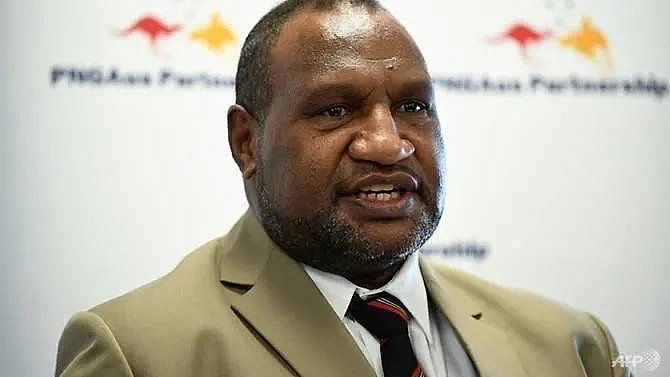Papua New Guinea asks China to refinance US$8 billion public debt
 |
| Papua New Guinea Prime Minister James Marape says he has asked China's ambassador to help in refinancing the country's debt AFP/JOEL CARRETT |
Beijing has been strengthening ties with Papua New Guinea and other Pacific nations by increasing engagement and offering loans for infrastructure, prompting both the US and Australia to launch their own charm offensives in the region to keep traditional allies on side.
Less than two weeks after travelling to Australia on his first trip abroad as leader, Papua New Guinea Prime Minister James Marape announced on Tuesday that he had asked China's ambassador for help in refinancing the country's 27-billion-kina public debt during a meeting in Port Moresby.
"He stated that a formal letter would be forwarded to the ambassador to convey to Beijing on this request," Marape's office said in a statement.
"He suggested that both the Bank of PNG and the PRC People's Bank will take the lead with the Department of Treasury in ensuring that consultations are underway."
Since becoming prime minister, Marape has vowed to combat endemic corruption at home and rebalance the country's relationships with allies and multinational companies exploiting Papua New Guinea's rich mineral resources.
According to the statement, Marape urged Beijing to enter into a free-trade agreement with Pacific island nations and suggested that China boost its investment in Papua New Guinea's forestry, fisheries and resources sectors.
Chinese ambassador Xue Bing raised concerns over the upcoming Pacific Islands Forum leaders' meeting being held in Tuvalu - which has diplomatic relations with Taiwan - and invited Marape to visit China, the statement continued.
Lowy Institue Pacific programme director Jonathan Pryke told AFP the request to Beijing, coming just after Australia rolled out the red carpet for Marape, would likely "ruffle feathers" in both Canberra and Washington as they seek to counter China's influence in the Pacific.
"If (China) were to restructure all of PNG's debt they would become the single largest creditor to PNG and that would give them a huge amount of leverage over PNG," he said.
"We've got no indication that China would be willing to do this, but if they did, I expect they would ask for some pretty firm concessions."
Australia's foreign affairs department, meanwhile, said it "welcomes support for the development needs of our Pacific partners ... provided it is transparent, upholds international standards, meets genuine need and avoids unsustainable debt burdens".
China has been accused of engaging in so-called debt-trap diplomacy by handing out onerous loans for infrastructure projects that poorer nations are unable to repay.
Cash-strapped Papua New Guinea faces "significant economic challenges", Pryke said, with interest repayments on the public debt, which stands at about 33 per cent of GDP, making up 15 per cent of the government's annual expenditure.
Loans from China make up just over 7 per cent of Papua New Guinea's total debt, he said.
What the stars mean:
★ Poor ★ ★ Promising ★★★ Good ★★★★ Very good ★★★★★ Exceptional
Related Contents
Latest News
More News
- Russian President congratulates Vietnamese Party leader during phone talks (January 25, 2026 | 09:58)
- Worldwide congratulations underscore confidence in Vietnam’s 14th Party Congress (January 23, 2026 | 09:02)
- Political parties, organisations, int’l friends send congratulations to 14th National Party Congress (January 22, 2026 | 09:33)
- 14th National Party Congress: Japanese media highlight Vietnam’s growth targets (January 21, 2026 | 09:46)
- 14th National Party Congress: Driving force for Vietnam to continue renewal, innovation, breakthroughs (January 21, 2026 | 09:42)
- Vietnam remains spiritual support for progressive forces: Colombian party leader (January 21, 2026 | 08:00)
- Int'l media provides large coverage of 14th National Party Congress's first working day (January 20, 2026 | 09:09)
- Vietnamese firms win top honours at ASEAN Digital Awards (January 16, 2026 | 16:45)
- ASEAN Digital Ministers' Meeting opens in Hanoi (January 15, 2026 | 15:33)
- ASEAN economies move up the global chip value chain (December 09, 2025 | 13:32)

 Tag:
Tag:




















 Mobile Version
Mobile Version